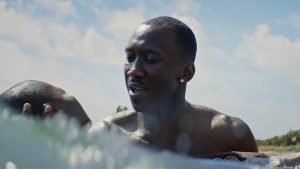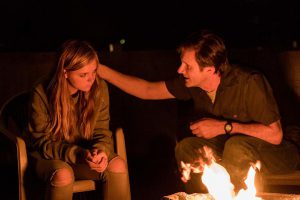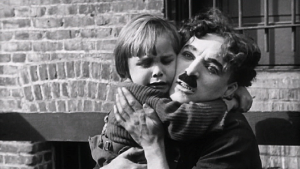Co-Authored by: Brittney Bluhm & Maeve O’Duggan
Winona State University’s film curation class hosted nine nights of screenings throughout the month of October 2018. All nine films related to the campus theme resilience, “the ability to adapt well and grow when faced with adversity or difficulty.” Moonlight (2016, dir. Barry Jenkins), Eighth Grade (2018, dir. Bo Burnham), Hunt for the Wilderpeople (2016, dir. Taika Waititi), and The Kid (1921, dir. Charlie Chaplin) present resilience by showing fluid relationships as a result of social pressures and conflict both child and adult characters experience, particularly children and parental figures in outdoor environments. Resilience is shown both as the child’s dependence on the parental figure for support and guidance as well as the child’s dependence on the parental figure in times of conflict and hardship.
In Moonlight, Little (Alex Hibbert) and later called Chiron (Ashton Sanders) struggles to interact with others for fear he could be beaten or killed due to his race, gender or his sexual identity. When “Little” Chiron struggles to live with his drug-addicted mother (Naomi Harris), he meets the older, wiser Juan (Mahershala Ali). Juan is the source of support and guidance Chiron needs and is seen as the father figure he never had. The film presents this supportive relationship when Juan takes Chiron to the beach and teaches him to swim.

Juan supports Chiron much like a father figure would
When Chiron learns that Juan is a drug dealer, he becomes distant in realizing that people like him have sold to his addicted mother. As the other parental figure, Chiron’s mother fails to care for her son in the harsh urban environment. As a result, he learns to fend for himself and confides in others, in particular Juan’s girlfriend, Teresa (Janelle Monae). Towards the end of the film when “Black” older Chiron (Trevante Rhodes) visits her in rehabilitation services, she asks him for forgiveness in failing to be there for him.

Chiron’s mother fails to support him on her own, leaving him to fend for himself
Juan and Chiron’s mother are two very different parental figures in that their relationships with Chiron are fluid or malleable during the tryptic-style narrative; Chiron depends on them both for support and guidance but when he is unable to find that support and guidance, he must go to others or depend solely on himself to learn and grow.

Kayla’s father reassures her that he loves her no matter what
Eighth Grade handles the theme of resilience similarly in that Kayla (Elsie Fisher) thrives off of social media in order to escape social pressures and anxiety. In her last week of eighth grade, she wants to be independent from her father (Josh Hamilton) much like any teenager these days wants. An important scene, towards the end, displays this transition from eighth grade to high school when Kayla decides to burn her time capsule memorabilia. She expresses her worry about someday raising a daughter and connecting that to the relationship she has with her father – one where the child will grow less dependent on her and will be more dependent on social media for personal growth. Her father reassures her he will always be there for her in times of need.

Ricky and Hec sitting together at the end of Hunt for the Wilderpeople
Hunt for the Wilderpeople seamlessly continues this idea of familial resilience. While the characters of Hec (Sam Neill) and Ricky (Julian Dennison) both endure physical resilience in terms of their wilderness survival, the heart of the story is draws decisively from their combined personal growth. Ricky, faced with the looming threat of juvenile prison, looks to Hec for much needed parental stability, even if the situation they’ve found themselves in is anything but stable. It quickly becomes apparent that Hec, thrust into the role of a begrudging father figure, needs Ricky just as much as Ricky needs him. While Hec has ‘the knack’ for physical survival, Ricky has grown up mentally adapting to a life of inconstant foster homes. Ricky remarks that Hec is “still processing” the death of his wife, using a phrase he obviously picked up through his years as a social services kid, and the films shows that Ricky is ultimately the reason Hec is able to process his wife’s death at all. By the end of the movie, viewers are left knowing that Ricky and Hec are stronger for the tragedy they faced, not because they experienced it, but because they overcame it together.

A tearful but joyous reunion between The Tramp and The Child
The Kid acts as a perfect thematic complement to Hunt for the Wilderpeople, exploring the profound strength of found family under a similarly heartfelt combination of comedy and drama. Like Hec, the Tramp (Charlie Chaplin) starts out as a reluctant caretaker for the Child (Jackie Coogan), but by the time the film skips forward five years, he has embraced the role wholeheartedly. The world these two characters inhabit is objectively a rough one, filled with poverty and hardship, but it’s painted brighter by virtue of their determination to make the best of it together. Like Moonlight and Hunt for the Wilderpeople, the narrative tension comes from the idea that these characters might be separated forever, but the Tramp goes to great strides to reunite with his child, fighting against forces that are mostly outside of his control in order to do so. It’s this sense of perseverance and love that makes the story of The Kid so strikingly sincere, and it showcases an excellent example of how resilience isn’t always something we develop for our own benefit, but instead as something we pursue for those we care about.
These four films offer a perfect encapsulation of resilience, particularly when viewed in conjunction with one another. Moonlight, Eighth Grade, Hunt for the Wilderpeople, and The Kid fit so well in our film series this year because they all emphasize the exact same thing: Human connection. The characters in these films go on journeys that end with them finding strength and meaning in the relationships they forge, and all of them end on hopeful notes about what the future holds for them. Watching these films reminds us that the world is a little easier to endure when you have someone by your side, and whether it’s letting someone rely on you, or allowing yourself to rely on others, these films show that people are at their most resilient when they’re together.

Trackbacks/Pingbacks